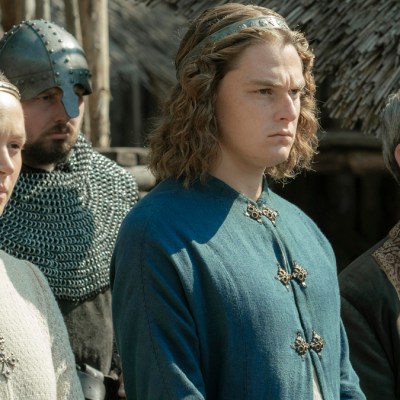The Last Kingdom Season 4 Episode 9 Review: the Rise of Sigtryggr

This The Last Kingdom review contains spoilers.
The Last Kingdom Season 4 Episode 9
And that, Edward, is exactly what Sigtryggr was talking about. Anger is not a battle plan. Storming red-faced up to the locked gates of a well-stocked, well-defended city and screaming “Do you surrender?” while your men drop like swatted flies is madness. Did you learn nothing about military strategy from your father? What was the number one rule? Always. Ask. Uhtred.
Uhtred is a changed man at this end of the season. Where once he’d have been scaling Winchester’s walls with a dagger between his teeth and vengeance in his heart, he’s learned that impetuousness leads to loss. It’s a lesson Edward sorely needs.
King Edward isn’t coming off well in season four. Two episodes ago, it looked as though he’d sloughed off his immaturity and taken on his father’s true mantle, but no. Wisdom is still a long way away for Alfred’s paranoid, blame-shifting, callow boy.
It’s not just his age. Younger characters than Edward showed good judgement in episode nine. Stiorra’s declaration that she’s both Saxon and Dane was a conclusion her father took decades to reach. Her impatient dismissal of cultural division as “a game for old men” was more wisdom, the mirror of Sigtryggr’s takedown of “the old generation” of Danish warriors. Men like Ubba, Bloodhair and Cnut let personal vengeance override sound tactics, and failed because of it.
Sigtryggr was also talking, of course, about Brida. From grinning over the execution of the Winchester guardsmen to laughing as she desecrated graves and decapitated long-dead Saxon corpses, Brida’s transition to this season’s Big Bad is complete. She’s no longer half of Uhtred’s life and all of his madness, now, she’s just madness. When Brida ordered Stiorra’s head be sent to Uhtred as a message, she crossed a line for fans. Her glee in capturing Winchester was beyond that of a warrior – it was the delight of a psychopath, captured beautifully by Emily Cox. In the eyes of the viewer, Brida’s moved from hero to villain.
Aelswith though, has travelled in the other direction. Where she was once Captain Buzzkill, spending three seasons crossing her arms, narrowing her eyes and pursing her lips at Uhtred, now she’s a woman of action who delivers rousing threats and promises to watch the souls of her enemies burn. It’s a thrilling turnaround, and an overdue use of everything Eliza Butterworth has to offer.
Aelswith’s scheme to disguise Aethelstan and Stiorra as Danes may not have worked, but it was cunning. She may not want to be treated as an animal, but her resolve and resourcefulness (and you know, history) promise that in her battle with Lord Aethelhelm, she’s the horse to back.
Speaking of characters stepping up, Eadith once again proved her bravery by volunteering to enter the Dane-pit that’s now Winchester. Stefanie Martini and Jamie Blackley have been solid casting as the disgraced brother and sister, conveying a complex relationship that despite everything, is still based on love. Eadith’s love for Eardwulf pushed her to cry out for mercy during his execution, and arguably, it was his love for her that pushed him to disclaim her as his sister. Had the Danes known of their connection, Eadith would have been in danger. By telling them to discard her, Eardwulf may have saved her life.
For as long as it lasts now that Haesten has her, at least. Haesten though, proved himself more a Saturday morning cartoon villain than a killer in episode nine. His ‘strung upside-down from a tree’ plan was pure Skeletor, designed precisely to allow Uhtred/He-Man’s escape. It was pantomime, but made for excellent viewing.
There was more good stuff in Stiorra’s two scenes in captivity, which established Sigtryggr as a new breed of Dane. The invaders we’ve met so far are a very different prospect from this cool-headed pragmatist. He may be a boy without reputation, but he learns and he listens, and he makes sage decisions. Sigtryggr’s speech to the men on the importance of unity and not succumbing to anger might, in another time, have come from Alfred himself.
Contrast that to Alfred’s son’s disastrous assault on the city and we have a picture of two very different leaders. Ultimately, we know who the victor will be (if you’ve been to Winchester, you’ll know they don’t speak Danish), but how victory will be won is a thrilling question. To the finale!


